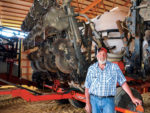Advertise Follow Us
Articles Tagged with ''Wheat''
From Seeds to Strips, Variety Goes the Distance
Sharon, Wis., strip-tiller Mike Cerny isn’t afraid to shake things up and adapt new practices to take productivity, yields to a higher level.
Read More






